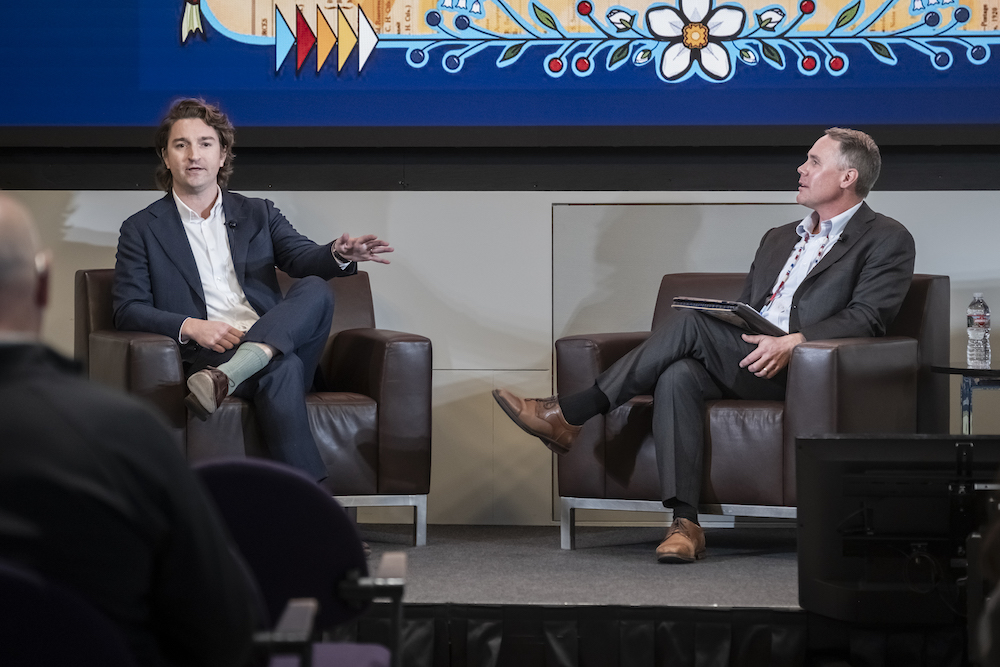
- Details
- By Brian Edwards
- Economic Development
MINNEAPOLIS — Tribal leaders need better tools to address persistent data gaps that undermine their governance and economic development efforts, according to Rob Maxim, a fellow at the Brookings Institution who spoke Thursday at the Federal Reserve Bank of Minneapolis' Center for Indian Country Development.
Maxim, a citizen of the Mashpee Wampanoag Tribe, outlined five critical data challenges facing Indian Country during a fireside chat with Casey Lozar, vice president and director of the Center for Indian Country Development. The discussion, held Thursday during the center's 10th anniversary event and data summit, focused on how poor data quality and limited access restrict tribal decision-making.
The most fundamental problem, Maxim said, is sample size. In a recent study of 16 federally recognized tribes in Southern California, three tribes had margins of error in their population data larger than their actual population counts. Two tribes had no population data available at all in Census Bureau records.
“If you believe the numbers, there is a number, but it might be twice as big, or maybe it’s negative,” Maxim said.
Other challenges include rural tribal geographies that don't align with standard census boundaries, federal data sets that treat Native Americans only as a racial category rather than sovereign nations, government surveys that ignore tribal priorities like language proficiency, and tribes' difficulty accessing data about their own citizens and lands.
During the pandemic, many Tribal Epidemiology Centers struggled to obtain state and federal COVID-19 case data for Native populations, Maxim noted.
The report Maxim co-authored, “Good Data, Stronger Tribes,” drew on interviews with more than 60 people, including tribal chairs, council members, and staff across planning, health, and economic development roles.
Maxim pointed to New Zealand as a model for Indigenous data sovereignty. There, Maori data sovereignty is recognized as a treaty right. Stats New Zealand, the statistical arm of New Zealand’s government, operates a joint platform with Maori tribes that tracks tribally prioritized indicators like language proficiency. Each tribe appoints a data manager who controls what information becomes public. Tribes also access a private portal with detailed data about their lands and citizens for governance purposes.
“This is the type of product I'd love to see pilot in the US, either on the federal or maybe even a state level,” Maxim said.
He highlighted positive developments in the United States, including a memorandum of understanding between the Osage Nation and the Census Bureau. The Osage Nation conducts a tribal census every five years and provides aggregated data to validate federal data collection about the tribe and eastern Oklahoma Indian Country.
Lozar opened the discussion by sharing his own tribe's experience with data. The Confederated Salish and Kootenai Tribes used data over 35 years to guide their purchase of a hydroelectric dam on their river, which now serves as a major revenue source. He also noted that data helped the tribes increase their ownership of the Flathead Indian Reservation from 22% in the early 1900s to about 72% today.
“Data can be a really powerful tool for positive change, empowering a community to serve its people well,” Lozar said.
Maxim urged tribal leaders to keep data on their agendas despite competing priorities, noting that good data remains critical to tribal sovereignty. He also called for more peer-to-peer learning among tribes.
Addressing the shortage of Native economists and data scientists nationwide, Maxim said organizations need to create on-the-job training pathways rather than requiring traditional academic credentials.
“Almost everything I do is learned on the job, and that's both the data work that I do, but also my understanding of tenets of tribal law and policy,” he said. “I'm totally self taught on this stuff, and I'm lucky to have had a job and a career that's been supportive of that.”
He also called on universities to include Indigenous perspectives on economics in core curricula rather than relegating them to electives. Western concepts like property rights, he said, don't resonate the same way for people from tribal communities where the federal government holds land title.
